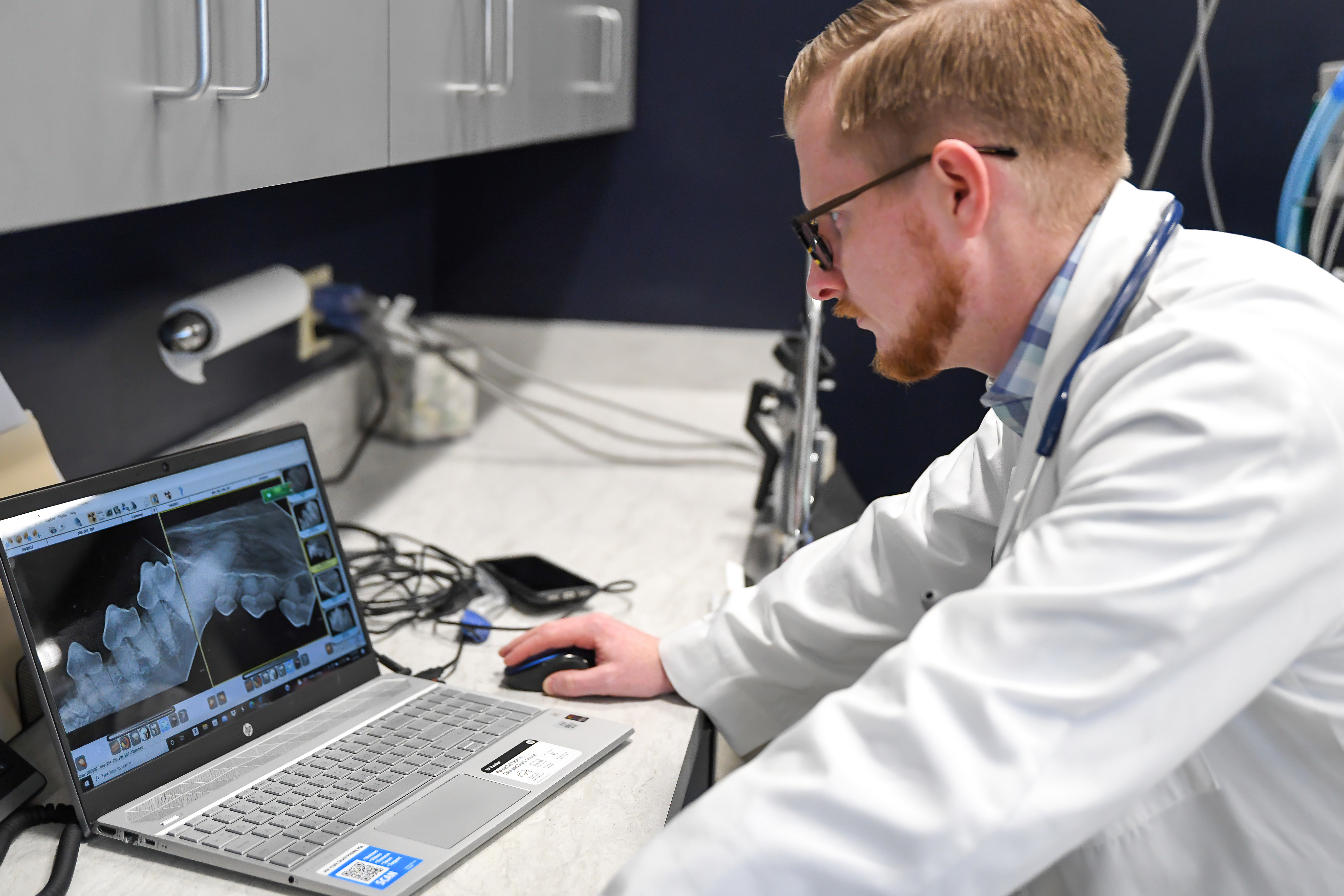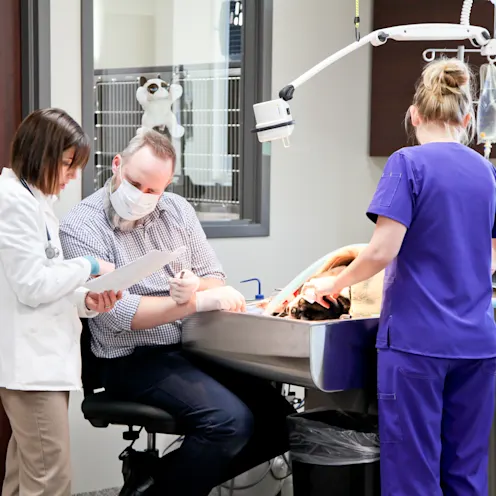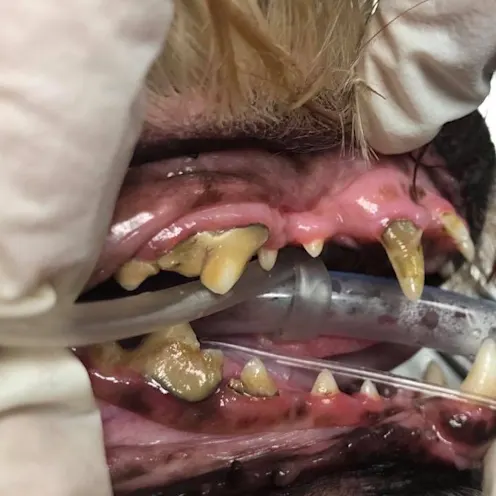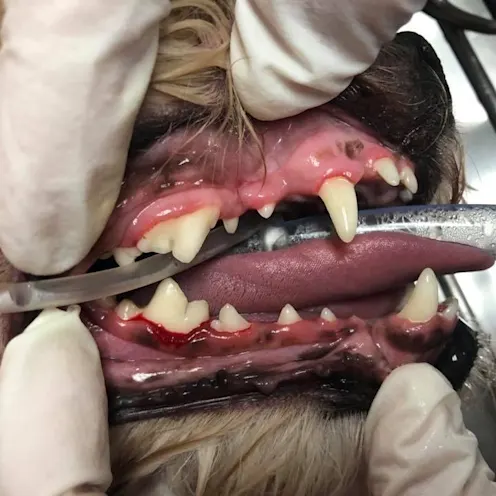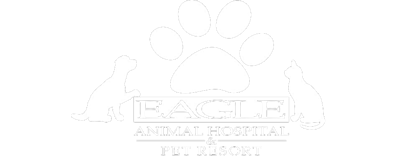Eagle Animal Hospital
How can I maintain my pet's dental health?
We believe in four simple steps to ensuring your pet’s dental wellness:
Dental care starts at home.
Professional dental care with your Kansas City pet dentist.
Learning the signs and symptoms of pet dental issues.
Knowing your pet’s preventative care and treatment options.
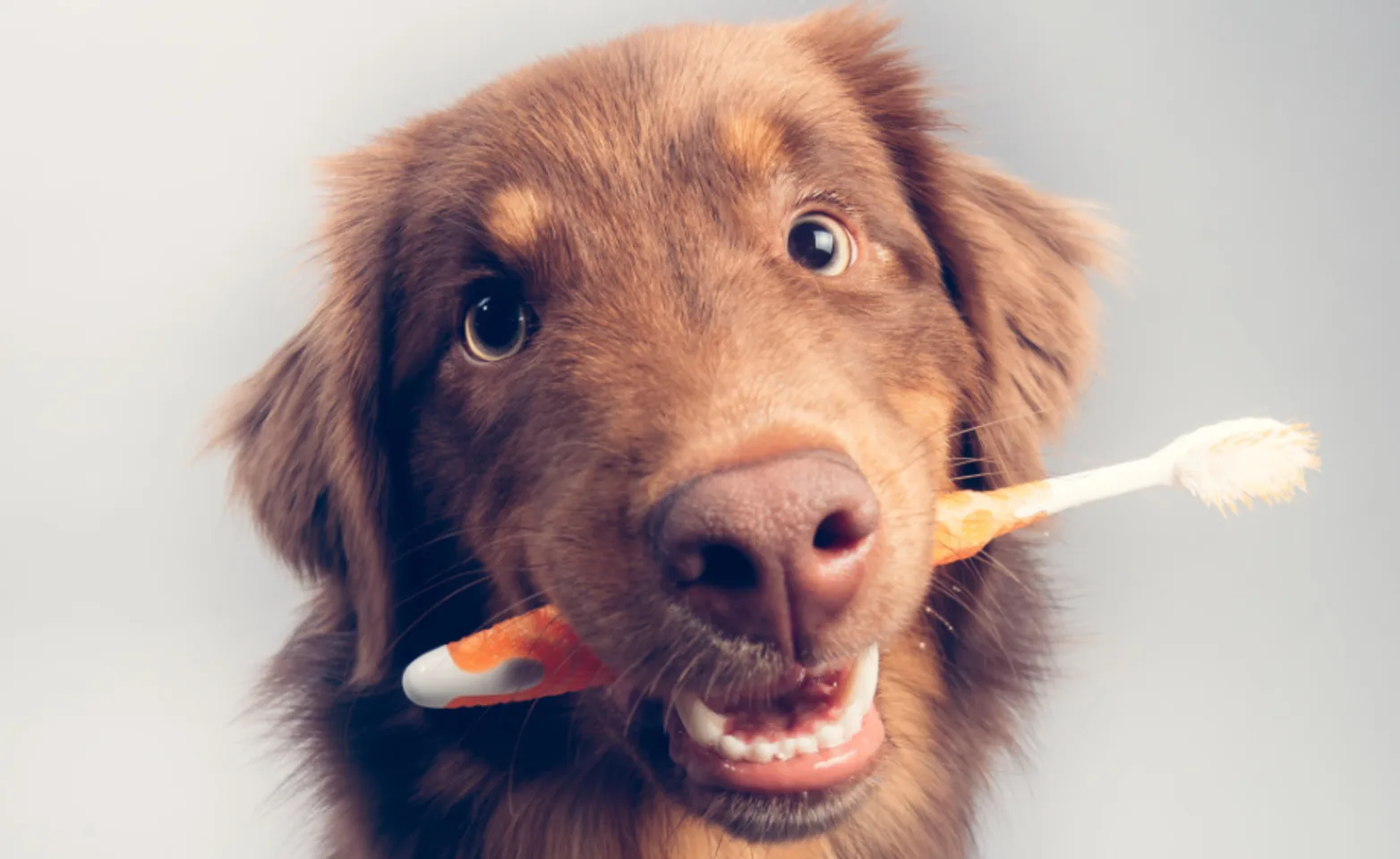
Dental care is an important part of your pet's overall health. That being said, at Eagle Animal Hospital, we believe preventive care is one of the best ways to keep your pet healthy and happy. We specialize in comprehensive dental exams for both cats and dogs, as well as specialized dental services such as oral surgery and other oral health procedures. Read on to learn more about our dental care services, and explore handy tips you can follow to care for your pet’s oral health at home.
Dental Care FAQs
Why does your pet need dental care?
There are many reasons why your pet needs routine dental care. Along with fighting bad breath and keeping their mouth healthy, preventative care can also help protect against dental diseases that could affect their overall health and well-being. You see, dental diseases like periodontal disease are one of the most common health problems in pets. When left untreated, dental disease can lead to serious health problems, including heart and kidney disease. By providing preventive dental care, we can help your pet stay healthy while avoiding painful health problems.
How often does your pet need dental care?
Generally, we recommend bringing your pet in at least once a year for a dental checkup during their annual wellness exam. This allows your veterinarian to examine your pet’s mouth and provide a general oral health assessment to ensure their optimal health. If we notice indications of dental disease or any other oral health issues, we can schedule your pet for a full oral examination and cleaning, which requires anesthesia to properly and safely examine, clean, and polish their teeth. Additionally, we can determine if we need to intervene early with any issues we identify that could cause serious problems if left untreated. Interventional treatments might include tooth extraction or restorative dentistry, for instance.
Along with an annual checkup, we encourage our clients to bring in their pets immediately if they notice any of the following issues:
Worsening bad breath
Discolored teeth
Noticeable plaque/tartar buildup
Redness, inflammation, and swelling
Red, bleeding, or receding gums
Discoloration of the gums
Bleeding from the mouth
Abscesses or wounds
Broken teeth
Loose, missing, or extra teeth
Difficulty/reluctance to chew or eat hard foods
Abnormal chewing or drooling
Lack of appetite
Mouth pain
Pawing at the mouth
What does a pet dental exam include?
Our dental care exams include a complete oral examination of your pet's teeth and gums, as well as a cleaning and polishing. In order to complete a thorough and safe exam and cleaning, we anesthetize your pet and monitor them closely throughout the duration of their procedure to ensure their health and comfort. During the procedure, your veterinarian will look for signs of common dental diseases, such as tartar buildup, gum inflammation, and tooth decay. Additionally, our dental care procedure includes:
Full exam and oral health assessment
Full dental X-rays
Gum probing
Tooth cleaning
Scaling and polishing
Bloodwork
Fluids
Any necessary periodontal treatments
Oral hygiene guidance for at-home care
As a pet parent, you want nothing but the best for your furry companion. One of the best things you can do as a pet owner is to ensure the overall health of your pet through routine at-home dental care, exams, cleanings, and preventative treatments. By being vigilant about your pet’s oral health, you can strengthen their overall health and well-being, protecting them from diseases that pass from the mouth to the bloodstream and into their vital organs like the heart, lungs, and kidneys.
Caring for Your Pet's Teeth at Home
One question we hear from pet parents quite frequently is, “How can I get plaque off my dog’s teeth at home?” While daily brushing is the simple answer, there are many ways you can optimize your pet’s oral health at home. Here are some handy hints to ensure your pet’s dental health at home.
OraVet Dental Hygiene Chews for Dogs
If you’re looking for a simple and easy way to help protect your furry best friend’s oral health while fighting bad breath, our Kansas City veterinarians recommend OraVet Dental Hygiene Chews. Not only do pets love the way these chews taste, but you will love how well these chews freshen their breath, clean their teeth, and provide optimal protection against plague and tartar.
Unlike any other dental chews available, OraVet is the only chew containing a safe yet powerful ingredient featuring dual-cleaning action for a super clean mouth. The special ingredient, delmopinol, effectively cleans their teeth and blocks bacteria that causes bad breath, while simultaneously preventing the formation of plaque and tartar that gradually builds up over time. With this once-daily chew, your pet will be smiling from ear-to-ear and you’ll feel confident knowing they have a cleaner, healthier mouth and fresher breath.
Brush Your Pet's Teeth Daily
Brushing your pet’s teeth every day can reduce tartar and plaque buildup. While this may be a challenging undertaking for finicky dogs and cats, it can and should be done. Here’s what you will need:
A toothbrush designed for dogs or cats – Typically a double-sided toothbrush made for dogs and cats in various sizes, or a squishy rubber toothbrush that fits over your finger.
Pet-friendly toothpaste – Never use human toothpaste or baking soda. Rather, find a pet-friendly toothpaste made with ingredients that are specially formulated for pets, and come in yummy flavors pets love).
Once you have the right dental products, follow these steps:
Let your pet sample the toothpaste so they can get used to the flavor.
Then, add some to the toothbrush, lift their lip to expose your pet’s teeth and gums, and begin brushing their teeth using gentle motions similarly to how you would brush your own teeth.
Be sure to get the molars and canines toward the back of their mouth, as these are problem areas for tartar buildup.
Once you are finished, reward your pet with a loving pat, hug, or some other gesture to make the experience a positive one.
Repeat the brushing exercise once daily, if possible.
FEED THEM PET-FRIENDLY FRUITS & VEGGIES
There are many pet-friendly fruits and veggies that support optimal dental health. Give them these tasty treats as rewards and snacks to promote their oral health.
*These foods may not be healthy for dogs with certain food allergies, sensitivities, or who are on strict diets. Consult with your veterinarian to learn more.
Carrots and Celery – These veggies are low-cal and provide many nutrients that are essential to your dog’s health and wellness, and the crunchy texture can naturally clean debris from your dog’s teeth. Plus, celery can even freshen your pet’s breath!
Apple Slices – The fibrous texture of apples can help reduce tartar buildup on your dog’s teeth. Feed them a couple of slices after a meal to freshen their breath — just make sure there’s no seeds in the slices!
GIVE THEM HEALTHY CHEWS
Dental chews are a great way to manage your pet’s oral health while giving them a tasty reward they’ll love. Look for vet-approved dental chews that are easy to digest, and be sure to supervise your pet while they’re chewing to prevent choking.
KNOW THE SIGNS OF DENTAL DISEASE
As a pet parent, knowing the signs and symptoms of dental disease can help you determine when it may time to visit your veterinarian for a dental exam. Some of the most common signs of dental disease may include:
Red or inflamed gums (gingivitis)
Bleeding gums
Noticeable discomfort when chewing
Difficulty chewing
Oral sensitivity
Yellow-brown tartar buildup
Bad breath
Excessive drooling (especially with blood)
Pawing at the mouth
Rubbing the face against the floor or furniture
Visible bone loss
Irritability
Depression or inactivity
If your pet is displaying any of these signs, or you are concerned about their dental health, we recommend connecting with your Kansas City vet immediately to schedule a dental exam.
